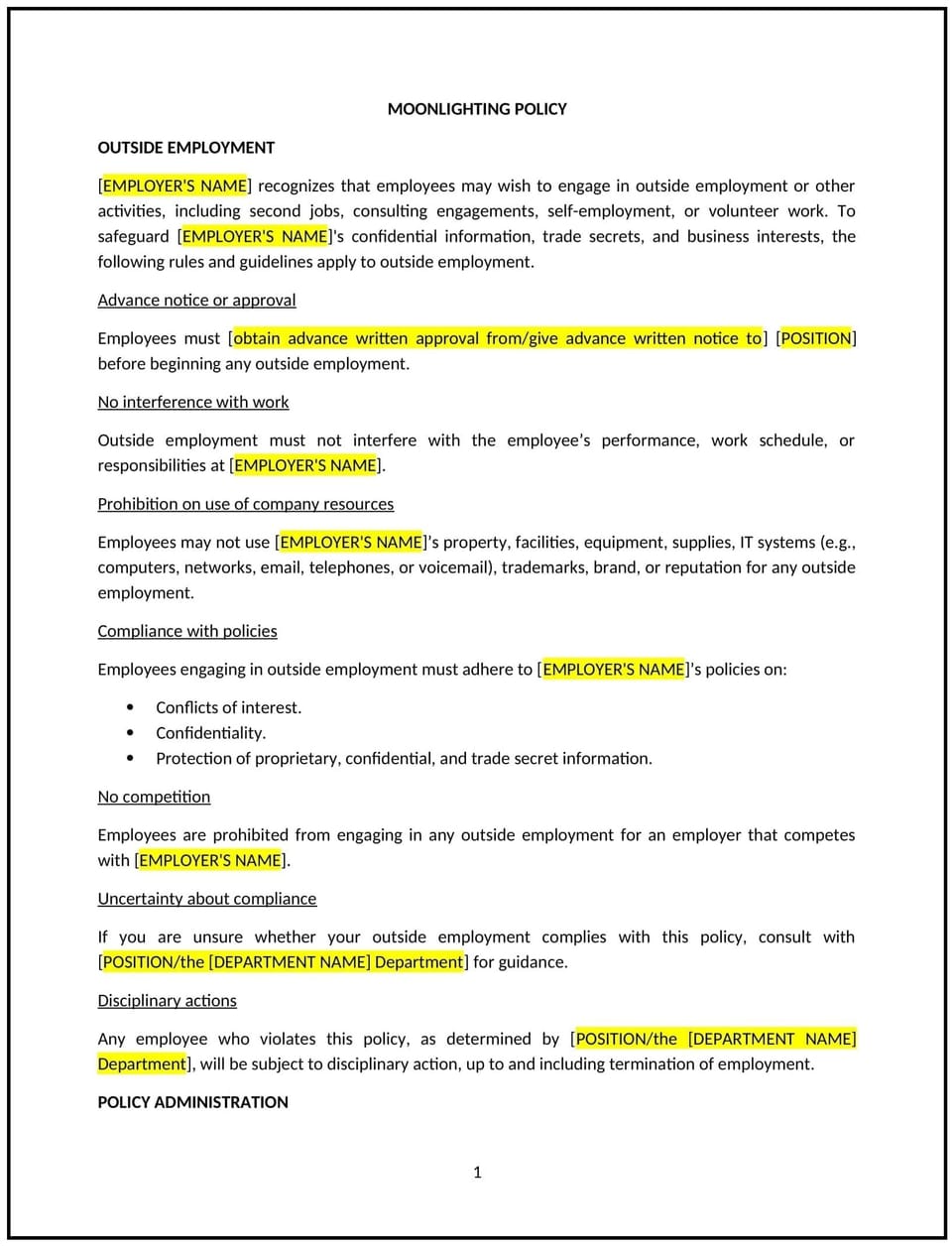Moonlighting policy (Kentucky): Free template

Moonlighting policy (Kentucky)
A moonlighting policy provides Kentucky businesses with guidelines for managing employees who seek secondary employment or engage in outside business activities while maintaining their primary role. This policy ensures that outside work does not conflict with the business’s interests, productivity, or confidentiality.
By adopting this policy, businesses can address potential conflicts of interest, ensure fairness, and promote transparency in employee conduct.
How to use this moonlighting policy (Kentucky)
- Define moonlighting: Businesses should explain what constitutes moonlighting, such as any paid or unpaid work performed outside the employee’s primary role.
- Outline disclosure requirements: Businesses should require employees to disclose any secondary employment or outside activities that could conflict with their primary job.
- Address conflict of interest: Businesses should specify activities that could pose a conflict of interest, such as working for a competitor or engaging in activities that compromise business confidentiality.
- Set performance expectations: Businesses should clarify that employees must continue to meet their primary job responsibilities and not allow outside work to impact productivity or attendance.
- Prohibit use of company resources: Businesses should explicitly forbid employees from using company resources, such as equipment, time, or information, for outside work.
- Detail approval processes: Businesses should outline the process for seeking approval for secondary employment, including submitting details to a manager or HR.
- Establish consequences for violations: Businesses should specify the potential disciplinary actions for failing to comply with the policy, such as warnings, suspension, or termination.
Benefits of using this moonlighting policy (Kentucky)
This policy provides several key benefits for Kentucky businesses:
- Prevents conflicts of interest: Helps businesses address potential issues that could compromise confidentiality or compete with the organization.
- Promotes transparency: Encourages employees to disclose outside work, fostering trust and open communication.
- Maintains productivity: Ensures that employees prioritize their primary job responsibilities and meet performance expectations.
- Protects company resources: Safeguards against the misuse of company assets for personal or outside business purposes.
- Reduces legal risks: Provides a framework for managing moonlighting activities while complying with Kentucky laws and regulations.
Tips for using this moonlighting policy (Kentucky)
- Communicate the policy: Businesses should ensure employees are aware of the moonlighting policy and understand their responsibilities through training and clear communication.
- Monitor compliance: Businesses should regularly assess whether employees are adhering to the policy and address potential conflicts proactively.
- Encourage disclosure: Businesses should foster a culture of transparency where employees feel comfortable disclosing secondary employment.
- Review conflicts of interest: Businesses should evaluate disclosures on a case-by-case basis to determine if outside work presents a conflict of interest.
- Update periodically: Businesses should revise the policy to reflect changes in Kentucky laws, business needs, or employee practices.
Q: What is the purpose of a moonlighting policy?
A: Businesses should use this policy to manage employees’ secondary employment and ensure that outside work does not conflict with their primary responsibilities or the business’s interests.
Q: Are employees required to disclose secondary employment?
A: Yes, businesses should require employees to disclose any outside work that could pose a conflict of interest or impact their primary job.
Q: What types of outside work are considered a conflict of interest?
A: Businesses should define conflicts of interest as work that competes with the business, breaches confidentiality, or uses company resources.
Q: Can employees use company resources for outside work?
A: No, businesses should prohibit the use of company resources, including equipment, time, or proprietary information, for secondary employment or personal activities.
Q: How should employees seek approval for moonlighting?
A: Businesses should outline a process for employees to submit details of outside work to their manager or HR for review and approval.
Q: What happens if moonlighting affects an employee’s performance?
A: Businesses should address performance issues by providing feedback and taking disciplinary action if necessary to ensure primary job responsibilities are met.
Q: Are there legal restrictions on moonlighting in Kentucky?
A: Businesses should comply with Kentucky laws related to employment agreements, ensuring that policies are fair and legally enforceable.
Q: How often should the moonlighting policy be reviewed?
A: Businesses should review the policy periodically to ensure it remains relevant to organizational needs, Kentucky laws, and evolving workplace practices.
This article contains general legal information and does not contain legal advice. Cobrief is not a law firm or a substitute for an attorney or law firm. The law is complex and changes often. For legal advice, please ask a lawyer.


